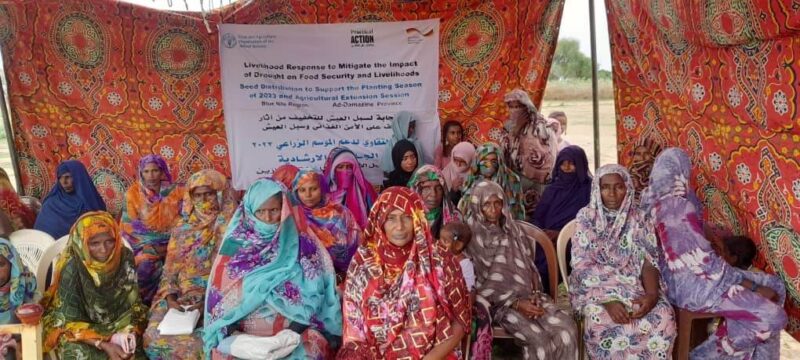Practical Action delivers in Sudan despite conflict
Practical Action has been working continuously in Sudan for more than four decades. Much of our work has been with rural communities in the states of Darfur, Blue Nile and Kassala.
Across the country, people are already facing the harsh impacts of climate change. Irregular weather patterns are causing droughts and resource-driven conflict.
Our staff have been working tirelessly to support people who are struggling to cope with desertification, environmental damage, soil degradation and lack of water.
The outbreak of war across the country in April has posed enormous additional challenges. Yet our staff have remained dedicated to delivering what they have promised to the people they work alongside, often at the risk of their personal safety.
Below, is an update on just some of the achievements of our Sudanese colleagues since April this year.

A collaborative effort

We are working with communities to improve the natural environment for farmers and pastoralists and adapt to climate change.
The plan involves water management and community-led reforestation activities. Our goal is to improve water accessibility, foster community forest growth, and enhance the region’s ecological balance.
Our work has been supported by the European Union and executed in collaboration with the United Nations Environment Programme (UNEP) and the UK Government.
Overcoming adversity: building and restoring dams

We have completed the construction and rehabilitation of one dam with a capacity of 308,000 cubic metres. We are also working on two more, which are 75 per cent and 40 per cent complete. For all the dams we have established water management committees with local communities, and they are fully involved in monitoring the construction process.
These dams are critical for preserving rainwater for agricultural use, livestock rearing, and replenishing underground water supplies.
We have also rehabilitated six water yards, each with a water tank and submersible pumps. Four of these yards are distributed among farmers and pastoralist communities for human use, with the capacity to support around 8,000 people.
In order to prevent conflicts with farmers, the other two water yards are situated along the nomadic pastoralists’ migratory route to provide drinking water for over 100,000 cattle.
Together with the dams, we are creating new areas of farmland and enabling farming and pastoralist communities to share water sources for their cattle and crops.
Farming more efficiently

Despite the conflict, we reached just under 900 farmers between April and June this year. We worked with them to support training via ten field schools where more than 300 people learned advanced agriculture techniques, such as crescent farming, crop rotatation and better spacing.
We have established 10 all-female horticulture groups, established school gardens to improve children’s nutrition and conducted refresher training for 40 people working as agriculture extension workers, who will be able to share their knowledge with more remote villages.
We have also helped to improve animal health through training in basic veterinary skills and through 30 awareness sessions and radio messages and posters.
Expanding opportunities: multiple cultivation cycles

With new dams, skills and better crop rotation, farmers can now engage in farming throughout the year, as opposed to the previous single season limitation. This increased water availability will also significantly expand the region’s cultivable land.
Previously only 30 families could farm in one village, the expanded dam infrastructure now enables nearly 200 families to work the land in a village.
United in preservation: bringing communities together throughout Sudan

Faced with numerous challenges, people have shown incredible solidarity in preserving their water resources and community forest. Our work in Darfur continues to be crucial to the long-term well-being of millions of people, and we remain steadfast in our commitment to operate whenever it’s safe to do so.
In Blue Nile state, we have trained people in natural resource conservation, managing small businesses and conflict mitigation. Workshops asked participants to look at how they can maintain available natural resources and design their own peace building approach to reduce tension among their communities.
And that’s not all
We have also been working closely with the UNDP and the FAO to help 25,000 farmers access 250 tonnes of seeds, so they can continue to feed themselves and their communities, despite the conflict.
We will also be launching new projects over the coming months, despite hugely increased costs so that many thousands more people can continue to adapt to their changing climate in the harshest environments.

Country Director Muna Eltahir said: “The majority of our team in Sudan have had to uproot and move to other towns, cities and even to other countries. Of those who have stayed in their homes, many are working in incredibly challenging circumstances. All of us have suffered.
“Yet, we remain dedicated to helping the people of Sudan most affected by climate change and most vulnerable to conflict.
“I could not be prouder of the fact we have continued to deliver what we promised and we are now able to look ahead and plan to help even more people in future.
“I urge people around the world to stand in solidarity with us and not to forget what is happening.”